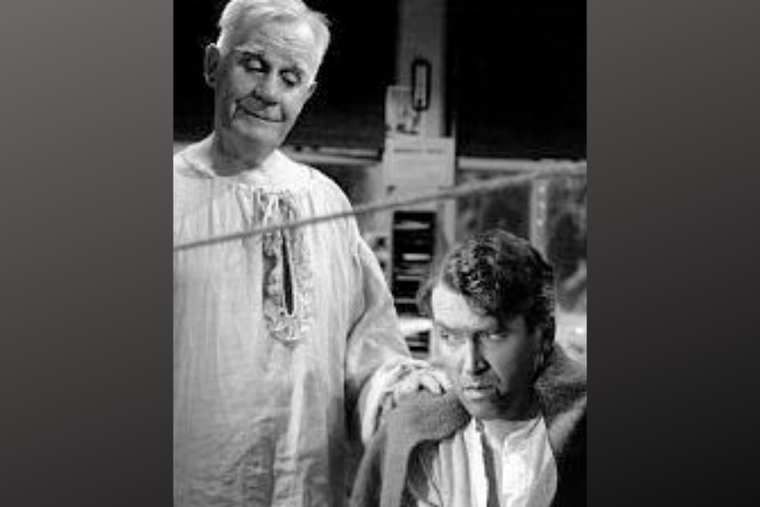George Bailey Still Teaches Us: ‘Our Father in Heaven Is There to Help the Hopeless’
‘It’s a Wonderful Life’ turns 75 but the story remains timeless.

Before Jimmy Stewart portrayed George Bailey, his guardian angel surely watched over him as he was flying harrowing combat missions in World War II. When Stewart was leaving for Air Force duty as a B-24 bomber pilot, his father slipped a copy of Psalm 91 into his uniform pocket, telling his son to pray it often — assuring him it would help him get through the war safely.
This simple incident made its way into Stewart biographies along with the poignant prayer:
“You shall not fear the terror of the night nor the arrow that flies by day. … Though a thousand fall at your side, ten thousand at your right hand, near you it shall not come. ... For God commands the angels to guard you in all your ways. … With their hands they shall support you, lest you strike your foot against a stone. ... Whoever clings to me I will deliver; whoever knows my name I will set on high.”
Maybe Stewart even thought of the Psalm as he portrayed the beloved Bailey character who has resonated with moviegoers for 75 years and made the Vatican’s “best-films” list in 1995. Stewart himself made no secret that, in his career spanning 50-plus years, It’s a Wonderful Life was his favorite film and George Bailey was his favorite role.
Bailey is a heroic figure who doesn’t realize he is one until God’s angel with the unlikely name of Clarence Oddbody, Angel Second Class, makes it clear that George’s simple, ordinary life really disguised an extraordinary one: What appeared to him and a few others as commonplace, routine and even minor was actually just the opposite.
Think of all the people in Bedford Falls who came to him for help, walking through the doors of Bailey Savings and Loan, like Ernie the cabdriver and Burt the cop and needy families; or misguided people like Violet he helped without repayment; and Uncle Billy, whom he treated with patience; as well as those ill, like Zuzu, whom he cheered; those whose lives he saved, like his kid brother, Harry, and Old Man Gower; and the Bailey family, whom he sacrificed for — life’s moments illustrating “you did it for me” (Mathew 25:40).
As viewers well know, Angel Clarence shows George what the town would be like and how others would have suffered if he was never born.
Director Frank Capra noted that he wanted such values to shine through this film. “I will show … the courageous renewal of faith,” he wrote, “and I will remind the little man that his mission on earth is to advance spiritually. ... My films must let every man, woman and child know that God loves them … and that peace and salvation become a reality only when they all learn to love each other.”
Decades later, Stewart recalled the moment eventually leading to the revelation. It was the scene where George knows there is nowhere else to turn. He believes his life is a shambles, and he’s on the point of despair. Yet deep inside him, there’s a spark of insistent hope.
Stewart explained that he followed the script, pleading, “God ... God ... dear Father in heaven ... I’m at the end of my rope. Show me the way.” And as he said this, Stewart said, he “felt the loneliness of people who had nowhere to turn,” and his “eyes filled with tears.”
“I broke down sobbing,” he said. “This was not planned at all, but the power of that prayer, the realization that our Father in Heaven is there to help the hopeless, had reduced me to tears.”
The spontaneity stayed. Director Capra worked hard to transform the unscripted, unrepeatable, heartfelt honesty into a telling close-up of that moment in the story.
That scene harkens back to the ending of Psalm 91: “He shall call upon me and I will answer him, I will be with him in distress; I will deliver him and glorify him; with length of days I will gratify him and will show him my salvation.”
Capra, a Catholic, explained that in It’s a Wonderful Life one major goal was to show that “each man’s life touches so many other lives,” as Clarence says in the time-honored film.
And God is ever near.
The prayers of the Bedford Falls townspeople that Christmas Eve were indeed answered. George gets the rare gift of seeing that his supposedly commonplace, routine life has truly been a wonderful life — a life that has tremendously helped make others’ everyday, ordinary lives shine as worthwhile and wonderful, too. He may not have known of St. Thérèse of Lisieux, but he was heading along her “Little Way.”
George Bailey is truly, as brother Harry calls him, “the richest man in town.”
If George’s life included a 75th birthday party, as Stewart’s did in his own hometown, he would likely repeat what the actor who played him said at that celebration: “This is where I made up my mind about certain things — about the importance of hard work and community spirit, the value of family, church, God.”
That quote sums up the tale of the George Bailey of Bedford Falls.
Living life simply, in the love of God and neighbor — truly, it’s a wonderful life.
- Keywords:
- it's a wonderful life
- george bailey
- james stewart














